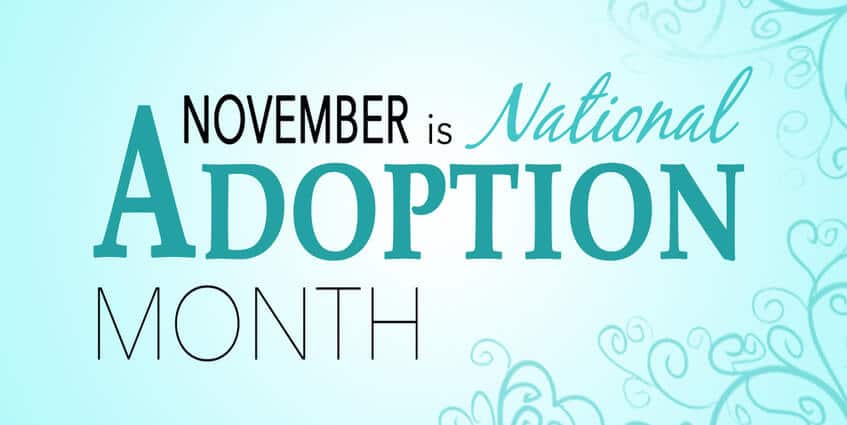November 2016 National Adoption Month – A Clinician Q&A
How Many Of Your Clients Are Adopted?
The percentage of adopted children in the U.S. is anywhere from 2-4% of the population. I would estimate that anywhere from 20-30% of our clients are adopted. This is significantly higher than the national percentage of adoptees.
What Behaviors Do You Typically See?
I don’t think that adopted children have more mental health, behavioral or addiction related issues that bring them into treatment. Many adopted children act out because they are struggling like most young people to develop their own sense of identity but unlike biological children, they have gaps in knowing where they came from and what they inherited from their families of origin. In addition, they can struggle feeling acceptance when such things as race, physical characteristics and intellectual ability may differ significantly from their adopted parents.
These children often feel an underlying fear of rejection and abandonment and therefore can push boundaries with their parents to test them to see how they can push them away, even to the point of pushing them to a point where they end up creating what they fear most, disconnection from their adopted families.
Can You Talk About Issues Of Identity?
One of the most important developmental periods for adolescents and young adults involves healthy identity development. Adopted children take on the added challenge of forming their identity while living in adopted families that may be of a different race, culture, physical characteristics, intellectual ability and other biological characteristics then they possess. In addition, they have gaps in their family history often having little to no information about their birth parents and families of origin, making it more difficult to put together the pieces of who they are and where they came from. These issues are particularly present in children that are internationally adopted.
Some of these children have experienced real neglect and trauma that can cause significant attachment related issues that create challenges in relationships and intimacy by the time they reach adolescence and adulthood.
Do You Encourage Adopted Clients To Seek Out Their Birth Parents?
I encourage adopted clients to open themselves to the possibilities of how being adopted may have an impact on what brought them to treatment. Many adoptees are unaware of this and have spent little to no time being aware of how being adopted can have an influence. Seeking out birth parents is a very individual process and is not something I would encourage unless the client expressed a willingness and readiness to do this. For some reconnecting with birth parents can be a vital part of their identity and healing process but this must proceed cautiously so that the adoptee is emotionally strong enough to work through the unknown outcomes of such a search.
They must also feel validation and trust from their adopted parents that such a search will not result in a sense of betrayal from them. One female client I worked with carried around deep insecurity in feeling unworthy of being loved because her birth parents didn’t want her. After going through wilderness treatment followed by a long-term residential treatment center as an adolescent, she ended up back in wilderness as a college student several years later.
She realized that the one issue she hadn’t been ready to confront prior was her adoption and it had now become the big elephant in her closet that required attention now. She was able to connect with her birth parents while in wilderness and the outcome was very favorable. She learned that her parents were young college age students with bright futures but were not ready for parenthood at that time. They made the difficult choice to give her adopted parents the gift of becoming parents while offering her a much more favorable future than they would be able to provide. This changed her entire self-image, that she wasn’t inherently bad and unlovable but was worthy of being loved and loving herself.
Is There A Difference Between Males And Females As Far As Wanting To Contact Their Birth Parents?
About 80% of young women express a willingness to seek out their birth parents while only about 20% of young men have this desire.
Can You Say Something About The Type Of Relationships Adopted Kids Have?
Relationships can be more intense for adopted kids. They either form a really strong attachment, or really weak because they’re afraid of rejection and having people leave them. They can often sabotage relationships so that they do the rejecting first before they can be rejected. This leaves them feeling the upper hand in relationships but at the cost of preventing them from more emotionally healthy relationships and intimacy with others.
What Advice Would You Give Adoptive Parents?
Talk with other adopted parents. Be involved in your own therapy while your child is away. Work to better understand your own feelings as your child experiences exploration of their adoption while working through your own fears of rejection by your adopted child. I would recommend Twenty Things Adopted Kids Wish Their Adoptive Parents Knew by Sherrie Eldridge to help adopted parents better understand what their adopted child is likely feeling and experiencing that they may be unaware of. Call Us Today | 1-866-439-0354 or 435-627-1788


Recent Comments